Archives
-
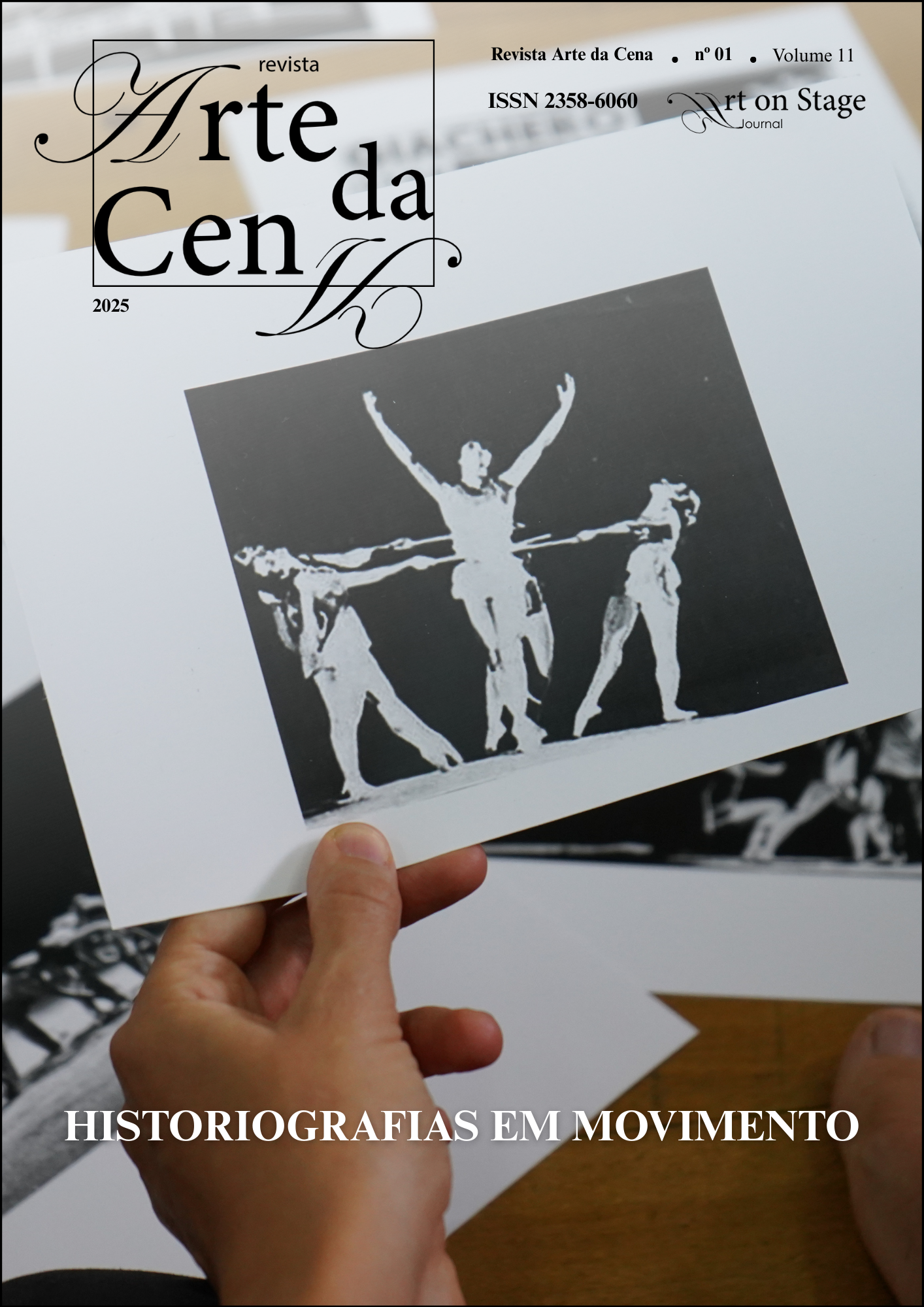
Historiographies on the move
Vol. 11 No. 1 (2025)The aim of this dossier is to critically analyze and discuss the links between dance, body, history and memory. To investigate, test and design new methodologies for the history of local dance in dialogue with theories already installed on the subject, which come mainly from the Dance Studies of the Global North, and include interdisciplinary approaches in dialogue with cultural studies, art history, cultural history and performance studies, etc.. We consider that making history and making dance or choreography would not be as opposed as they are usually understood, for this reason we problematize the notions of archive, reconstruction and heritage. Dance as a mode of representation will allow us to intervene and disrupt its own canon, and to test formulations from other disciplines in terms of the specific historical practices of dance.
Guest Editors:
Dra. Eugenia Cadús (CONICET – Universidad Nacional de las Artes – Universidad de Buenos Aires)
Dra. Alejandra Vignolo (Universidad Nacional de las Artes – Universidad de Buenos Aires)
Editor-in-Chief: Rafael Guarato
Associate Editorors : Joana Abreu e Saulo Germano Dallago
Layout: Otair Flor
-
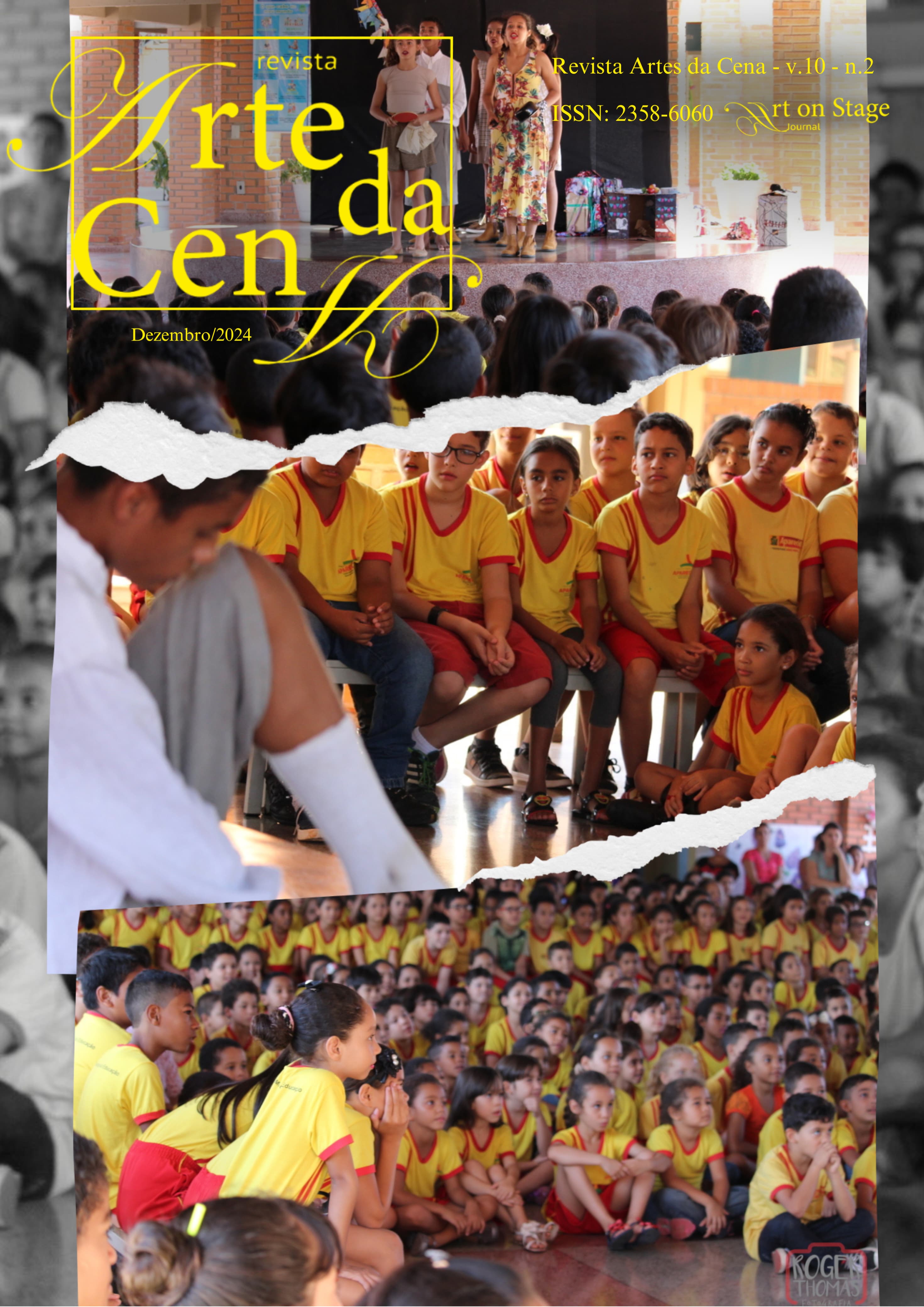
As Artes da Cena nos Palcos das Infâncias (Parte II)
Vol. 10 No. 2 (2024)This thematic dossier is dedicate to problematizing childhood and the performing arts – circus, dance, production design, theater, opera, performance – in interface with other fields of knowledge, such as education, sociology, psychology, history, among others. It brings together narratives about artistic practices with/for/by children, but also in the investigative contexts of educators and artists who have been working with pedagogical experiences involving childhood and children at their various stages of development.
Guest Editors: Fernanda de Souza Almeida and Natássia Garcia
Editor-in-Chief: Rafael Guarato
Assistent Editor: Joana Abreu e Saulo Germano Dallago
Layout: Otair Flor
-
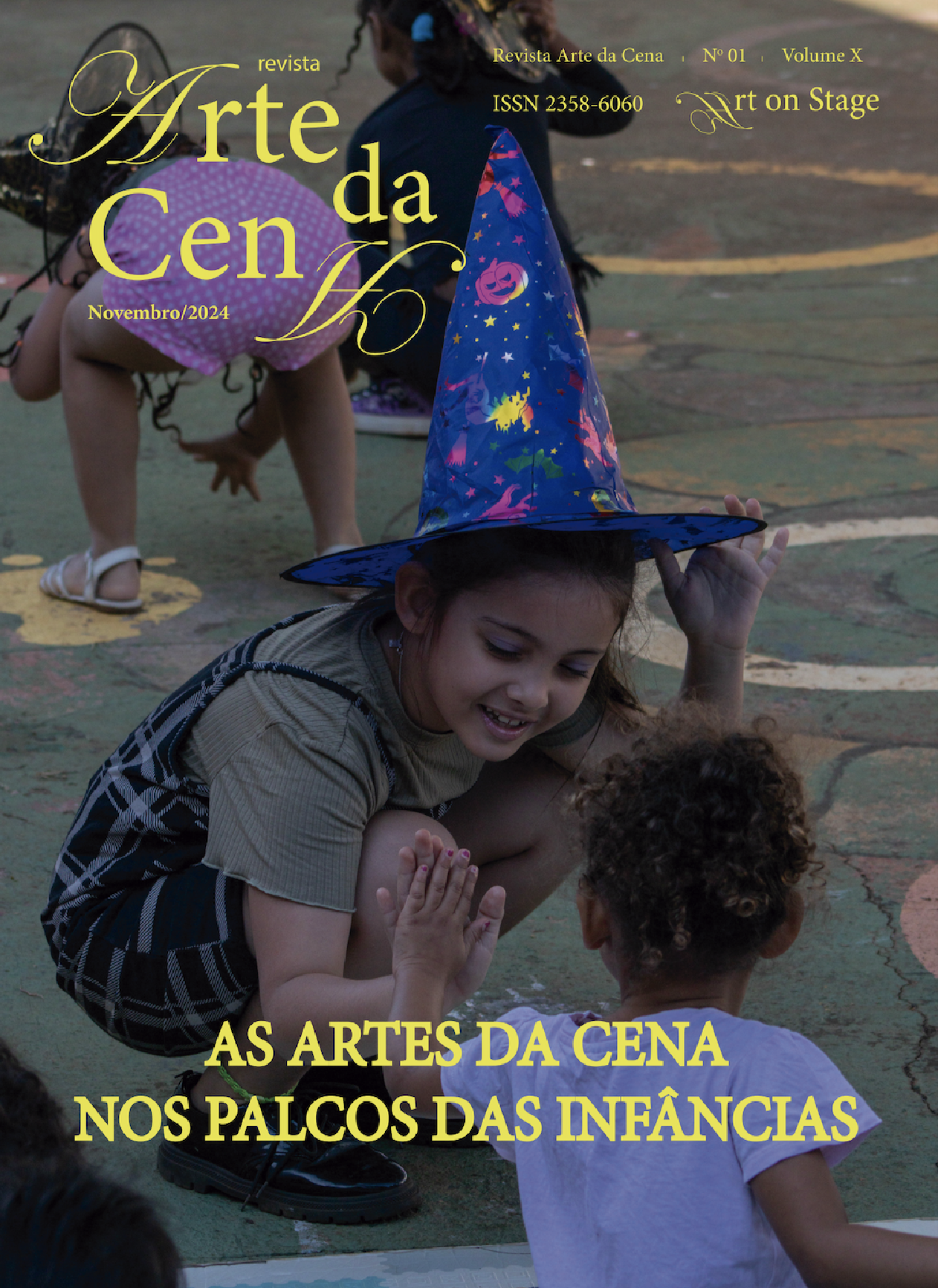
The performing arts on the estages of childhood (Part I)
Vol. 10 No. 1 (2024)This thematic dossier is dedicate to problematizing childhood and the performing arts – circus, dance, production design, theater, opera, performance – in interface with other fields of knowledge, such as education, sociology, psychology, history, among others. It brings together narratives about artistic practices with/for/by children, but also in the investigative contexts of educators and artists who have been working with pedagogical experiences involving childhood and children at their various stages of development.
Guest Editors: Fernanda de Souza Almeida and Natássia Garcia
Editor-in-Chief: Rafael Guarato
Deputy Editor: Saulo Germano Dallago
Layout: Otair Flor
-
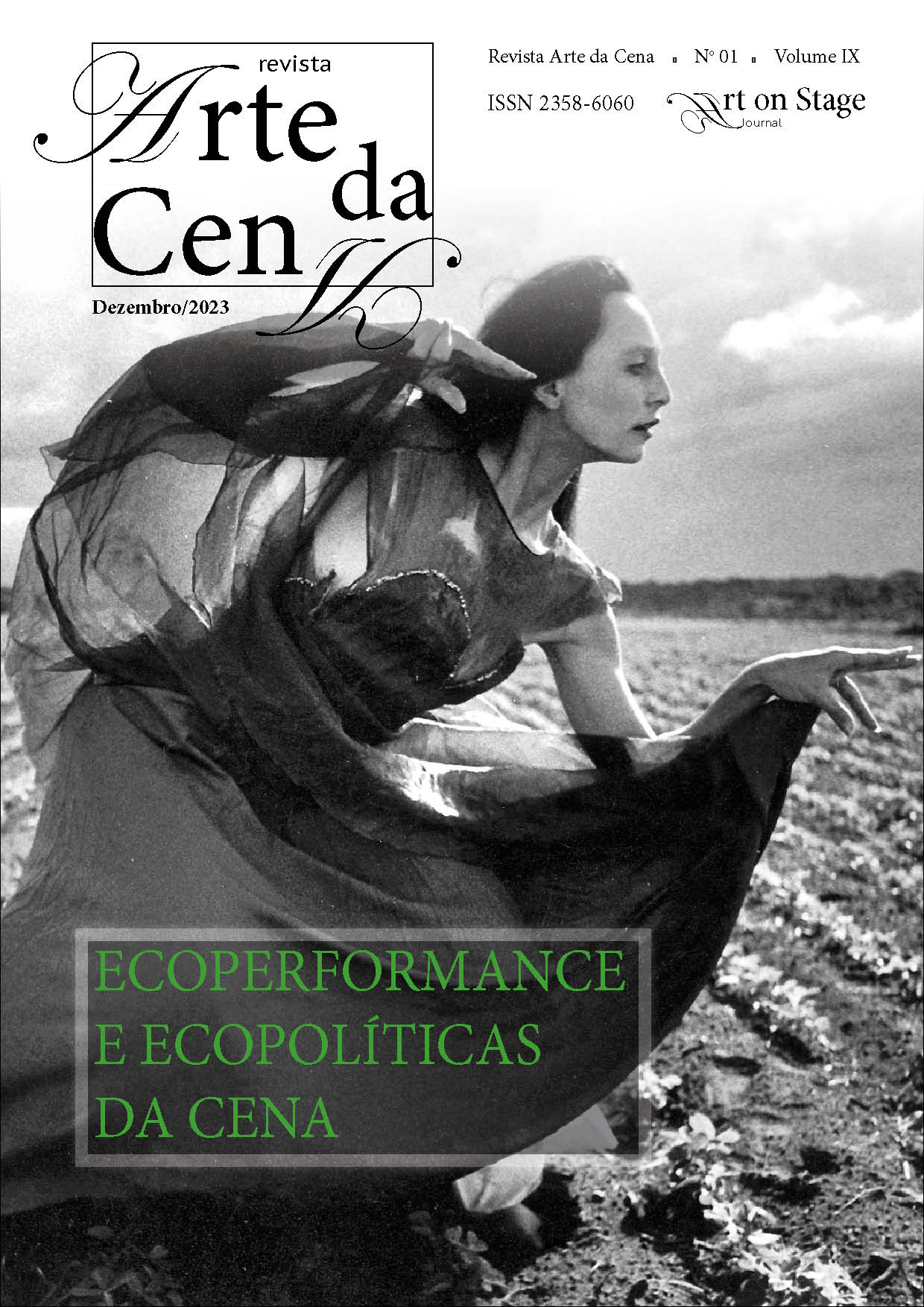
Ecoperformance and Ecopolitics of the Scene
Vol. 9 No. 1 (2023)Aiming at a paradigmatic transformation of the performing arts, the new edition of Arte on Stage Journal explores the performative relationships between the environment, body and ancestry.
In dialogue with the conceptual work of Brazilian choreographer Maura Baiocchi (ecorporality, ecoperformance, eco[po]etics), Volume IX of the journal is the result of cooperation between the Postgraduate Program in Performing Arts at the Federal University of Goiás (UFG ) and the Ecoperformance International Film Festival.
Features articles, interviews, essays and reports by academics and artists from Argentina, Australia, Brazil, France, Germany, Poland and Russia:
Wolfgang Pannek, Maura Baiocchi, Frê Arvora, Mateus Scota, Bianca Scliar Cabral Mancini, Kamila Mamadnazarbekova, Joelma Araújo, Marcela Cavallini, Sofia Mussolin, Laura Castro de Araújo, Candice Didonet, Shane Pike, Regilan Deusamar Barbosa Pereira, Juliana Maria Greca, Daniela Kuhn, Julie Dind, Juliana Lima, Raimundo Kleberson de Oliveira Benício, Adriana Rolin, Ana Carolina da Rocha Mundim, Sidnei Puziol Junior, Jarek Lustych, Alexandre Silva Nunes, Eleonora Candelaria Silvestro.
Curator: Wolfgang Pannek
Editor: Alexandre Nunes
Associate Editors: Rafael Guarato and Saulo Germano Sales Dallago
Review: Mônica Cristina Bernardes
Cover Photo: Raphael Mendes
Design: Alexandre Nunes
Editorial Board of this Issue: Adriano Jabur Bittar, Alexandre Ferreira, Ana Reis Nascimento, Antje Budde, Anton Bonnici, Ciane Fernandes, Elisa Abrão, Clarice Costa, Juan Ignacio Vallejos, Julie Dind, Luciana Paludo, Marcelo Comandu, Mateus Bertone da Silva, Rafaela Blanch Pires, Ricardo Malveira, Rolf Gerstlauer, Rosi Martins, Saulo Dallago, Tanatchaporn Kittikong, Valéria Maria Chaves de Figueiredo, Wojciech Olchowski.
-
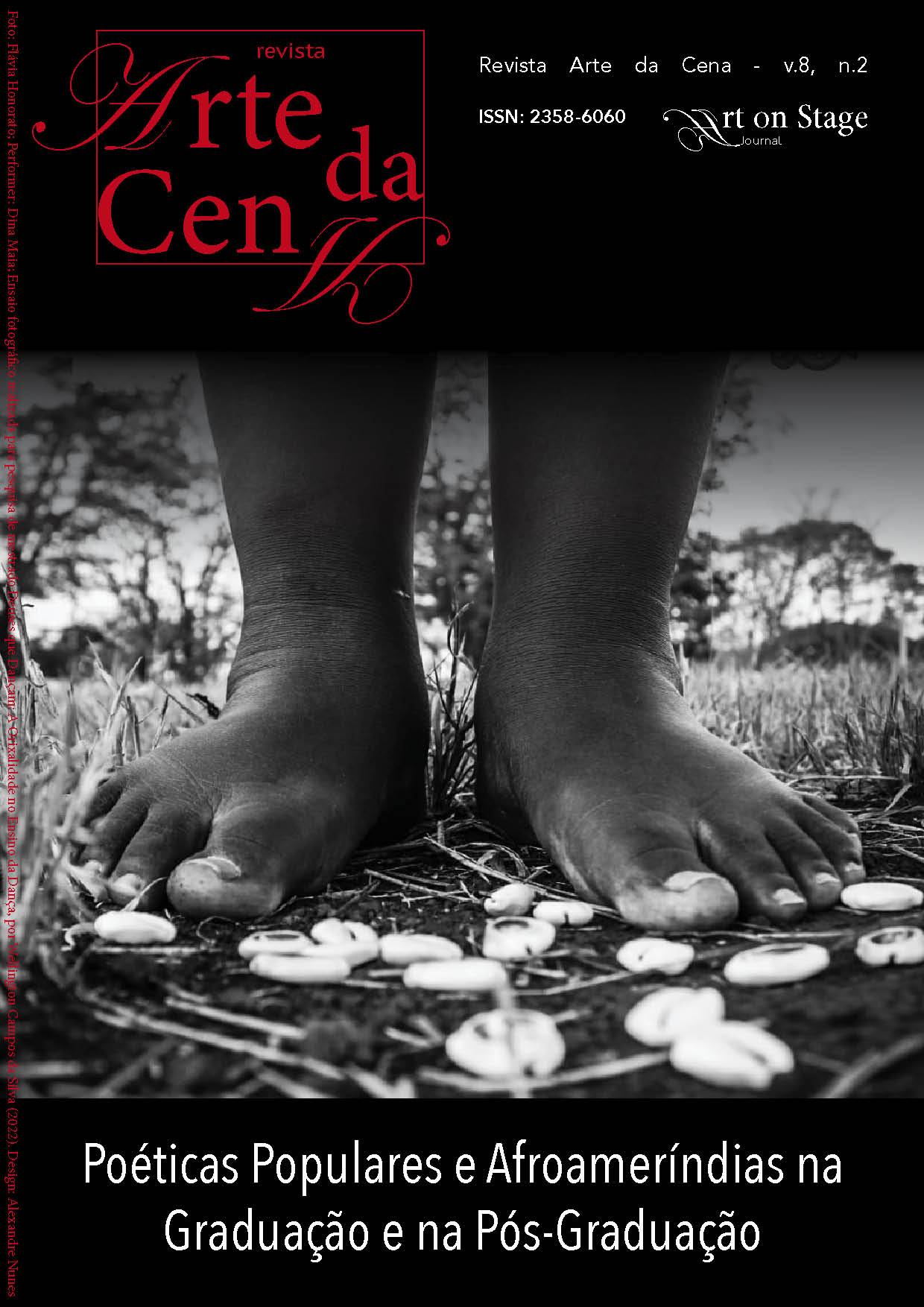
Popular and Afro-Amerindian Poetics in Undergraduate and Graduate Studies
Vol. 8 No. 2 (2022)This issue of Art on Stage Journal intends to collect articles dealing with debates and experiences about traditional and popular knowledge at universities, in undergraduate or graduate academical courses, concerning teaching, researching or University extension. The goal here is to know how those knowledges and practices have been approached in different educational contexts and/or also in different parts of the country, in order to learn and publicize strategies, experiences, methodologies, conceptual propositions and practice-based thinking.
Guest Editors: Renata de Lima Silva (Kabilaewatala) and Marlini Dorneles de Lima
Editor-in-Chief: Alexandre Nunes
Asociate Editor: Rafael Guarato and Saulo Germano Dallago
Cover - Photo: Flávia Honorato. Performer: Dina Maia. Photo essay carried out for master's research "Gods who dance: the orixality in dance teaching" (UFG), by Wellington Campos da Silva (2022). Layout: Alexandre Nunes.
-
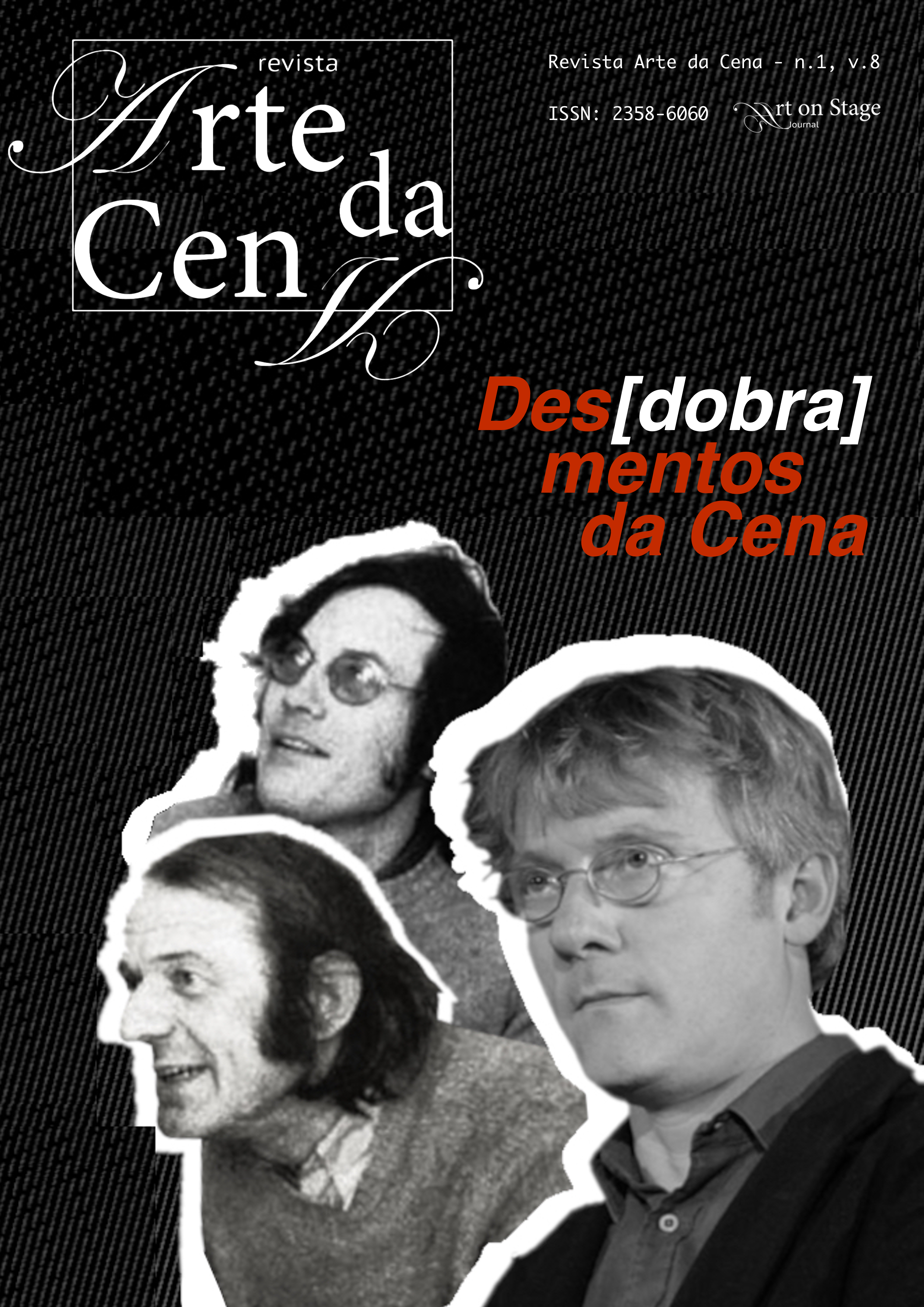
Un[fold]ing of the Performance
Vol. 8 No. 1 (2022)This issue of the Arte on Stage Journal brings to the reader, under the title Un[fold]ing of the Performance, a set of articles on various topics, being opened by two conferences of great relevance to the current situation of the performing arts in their relations with the poststructuralist philosophy of Gilles Deleuze and Félix Guattari.
-
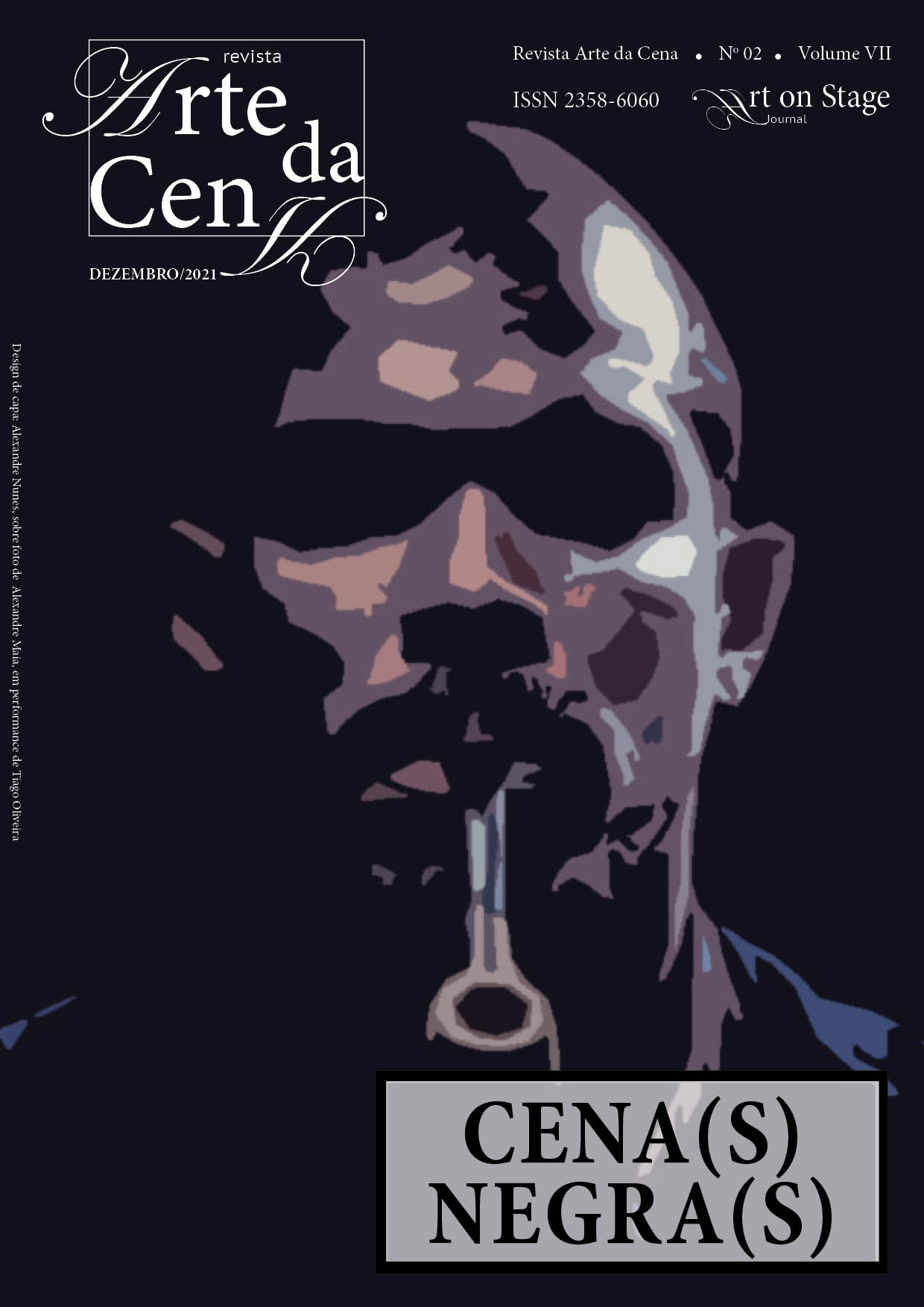
Black(s) Performance(s)
Vol. 7 No. 2 (2021)The present issue emerge with the urgency of the contemporary demand relative to several views and multiples performing approach of dance, theatre, circus, scenography and production design and the black way of life in context of diaspora. This dossier gathers papers focused on Black Performance, those involving blacks artists and their several forms of knowledge and struggle for visibility of differences. The publication aims to compile analyses about the black presence and wisdom in Performing Arts and all possibilities of scenic creation, including aesthetic, anthropologic and historic perspectives that involve questions relative to intercrossed policies, performances, poetics, localities, dramaturgies, corporealities and epistemologies.
Guest Editors: Renata de Lima Silva (Kabilaewatala) and Joana Abreu
Editor-in-Chief: Alexandre Nunes
Deputy Editor: Rafael Guarato and Saulo Germano Dallago
-
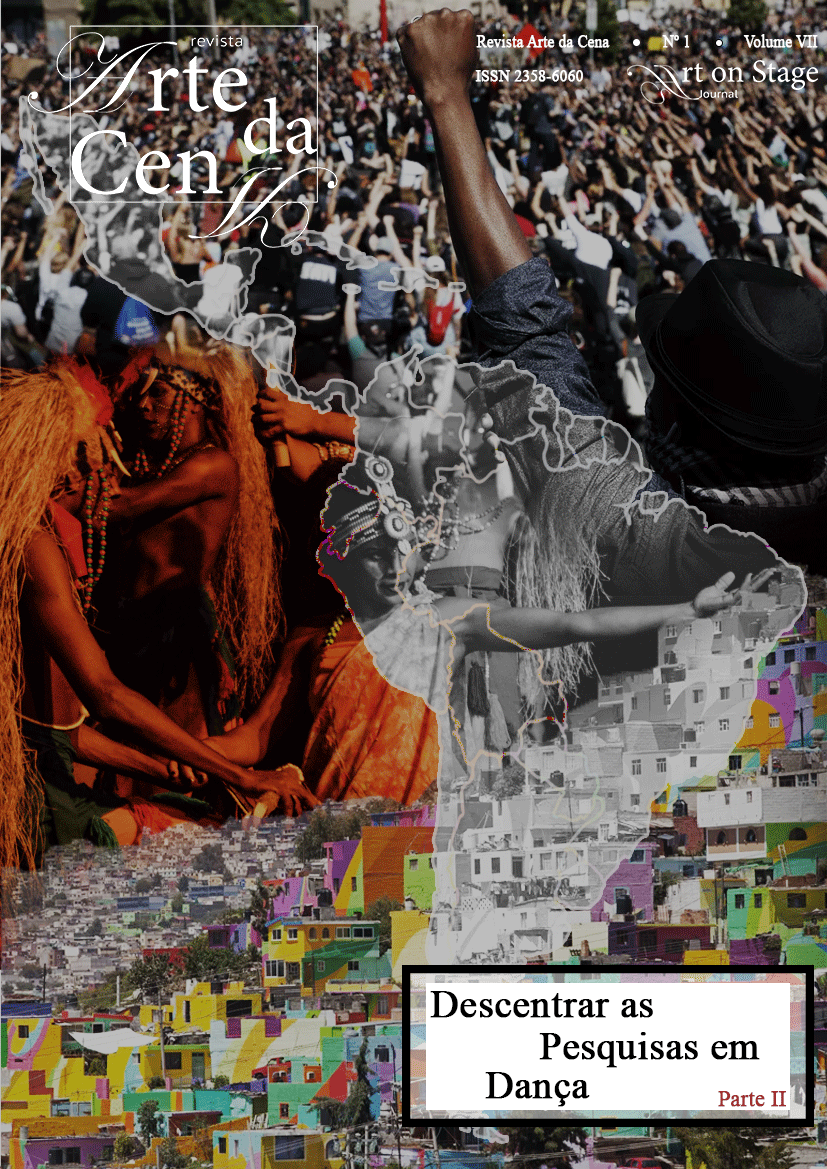
Decentering Dance Research (Part II)
Vol. 7 No. 1 (2021)This issue is the result of the volume of research interested in carrying out a work of decentralization of dance studies which allows different reflection instances, based on the diagnosis that the practices of academic and artistic research still participate in the construction and maintenance of discourses that invest in the separation between "center' and "periphery, linked to eurocentric and american-centric assumptions.
Through this dossier, objective is to favor an extension of dance corpus research, taking as reference the recent works on: cultural exchanges, post-colonial e decolonial studies; but also an exploration of the tension sites existing in the field. It’ll then be a movement to decentralize the look on dances, to decentrealing legitimizing stories, to decentralize institutional conditioning and decentralize ourselves as subjects of knowledge. We propose decentralization as a research exercise that favors the knowledge emergence and exploring the potential of dance research. In addition to its multiple and possible definitions, we understand decentralization as a critical practice and procedure in constant motion.
Guest Editors: Ana Teixeira, Isabelle Launay, Javier Contreras, Juan Ignacio Vallejos, Patricia Aschieri
Editor-in-Chief: Alexandre Nunes
Asociate Editor: Rafael Guarato
-
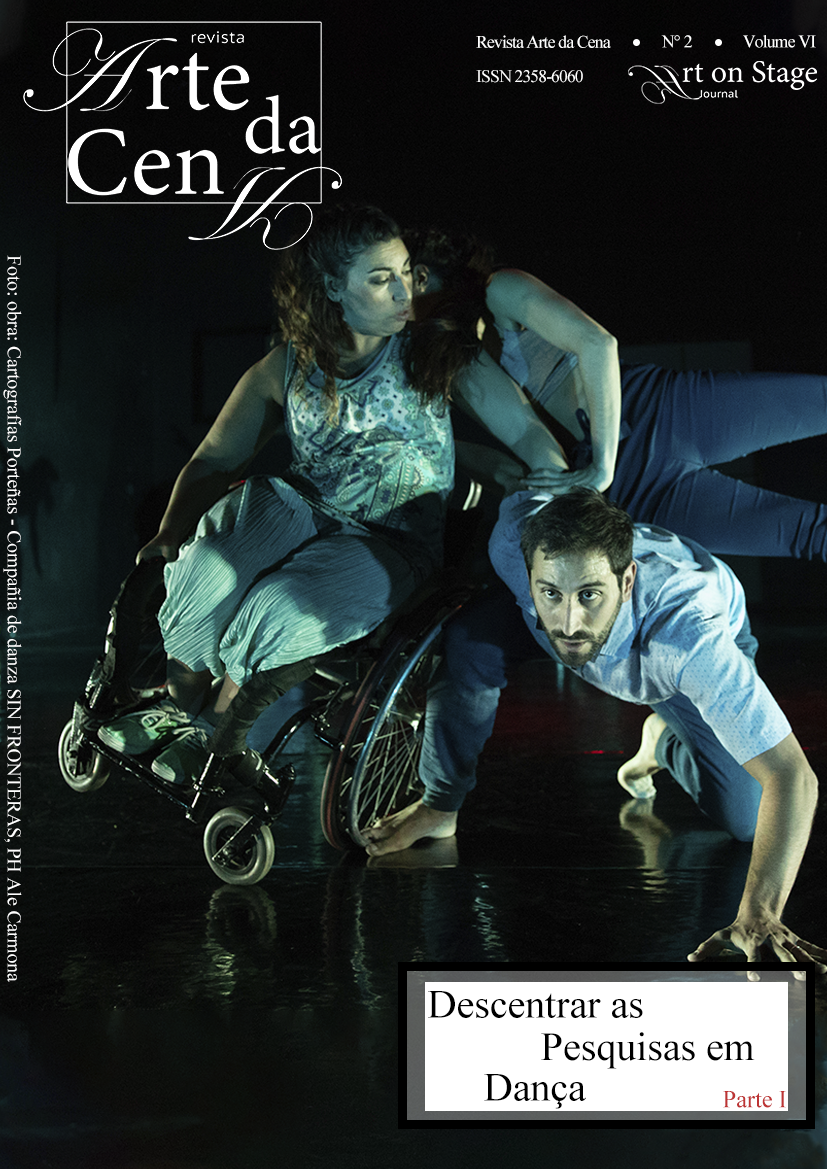
Decentering Dance Research
Vol. 6 No. 2 (2020)The purpose is to carry out a work of decentralization of dance studies which allows different reflection instances, based on the diagnosis that the practices of academic and artistic research still participate in the construction and maintenance of discourses that invest in the separation between "center' and "periphery, linked to eurocentric and american-centric assumptions. Therefore, it’s necessary to stop operating from the logic that adopts universalizing understanding of "dance history". It isn’t a simple task, especially as long as the hegemonic narratives aren’t destabilized: Is it possible to decentralize dance studies and practices that problematize this condition? The decentralization we seek is projected at different levels: historiographical, ethnographic, gender, racial, class, aesthetic, kinesthetic, choreographic, cultural, political, economic and social. Through this dossier, we’d like to contribute to the establishment of a general movement that encourages critical reflection in dance studies, as well as, that promotes an attentive investigation of the exchanges, circulation and power relations that condition dance and research practices.
Our objective is to favor an extension of dance corpus research, taking as reference the recent works on: cultural exchanges, post-colonial e decolonial studies; but also an exploration of the tension sites existing in the field. It’ll then be a movement to decentralize the look on dances, to decentrealing legitimizing stories, to decentralize institutional conditioning and decentralize ourselves as subjects of knowledge. We propose decentralization as a research exercise that favors the knowledge emergence and exploring the potential of dance research. In addition to its multiple and possible definitions, we understand decentralization as a critical practice and procedure in constant motion.
Guest Editors: Ana Teixeira, Isabelle Launay, Javier Contreras, Juan Ignacio Vallejos, Patricia Aschieri
Editor-in-Chief: Alexandre Nunes
Asociate Editor: Rafael Guarato
-
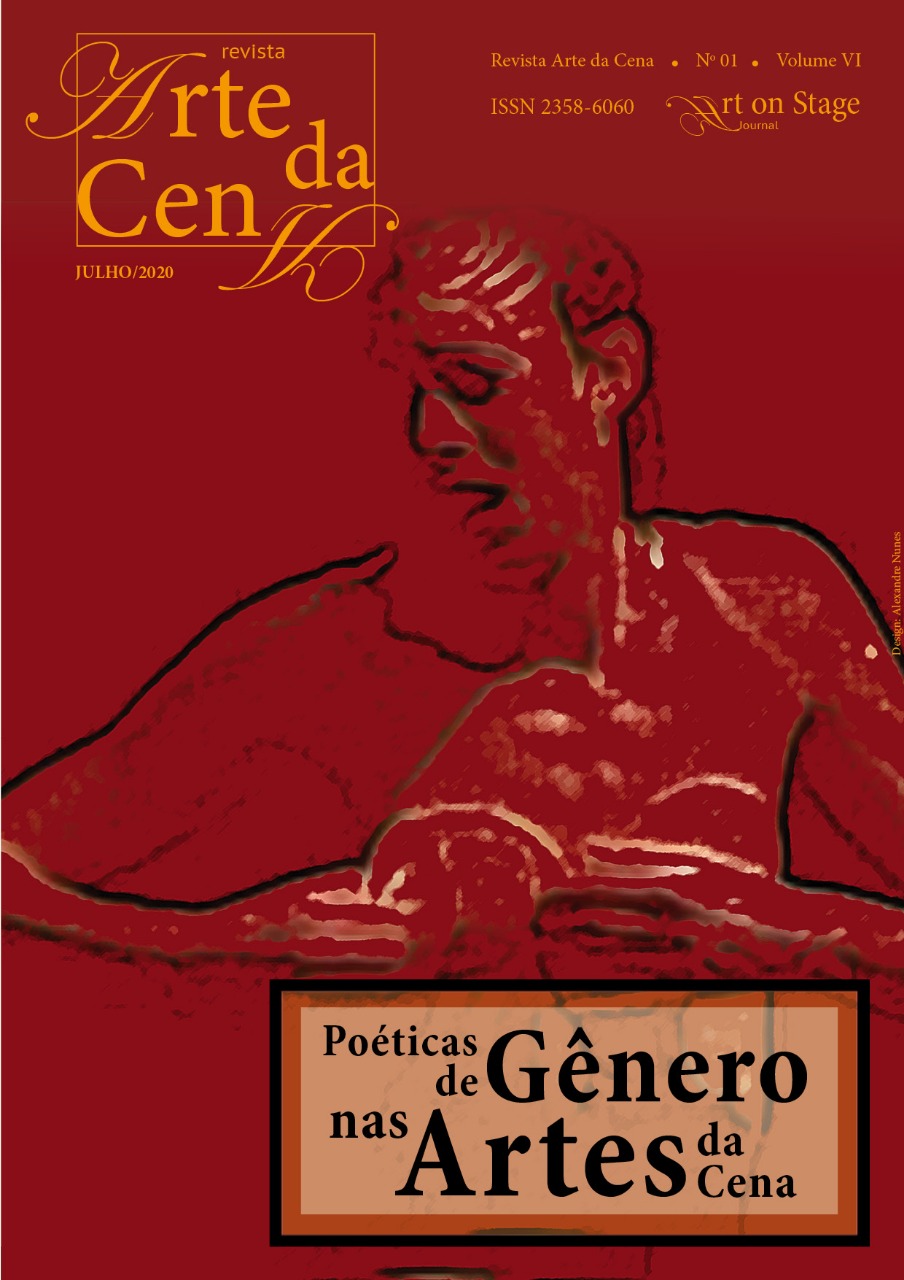
Gender Poetics in the Performing Arts
Vol. 6 No. 1 (2020)Its aims are discussing and promoting reflections on the current discussions that have arisen about sexuality, the questions that involve the discussion of gender and the poetics of the scene that reflect and discuss the topic. The several forms, languages and manifestations of the performing arts area, shows whether a fertile field to reflections, in reason of her own constituents matrices, that open to imaginary of the otherness and the interchangeability of the characters, as well as by contemporary emergence that these issues presents on performance manifestations, shows and theory reflections.
-
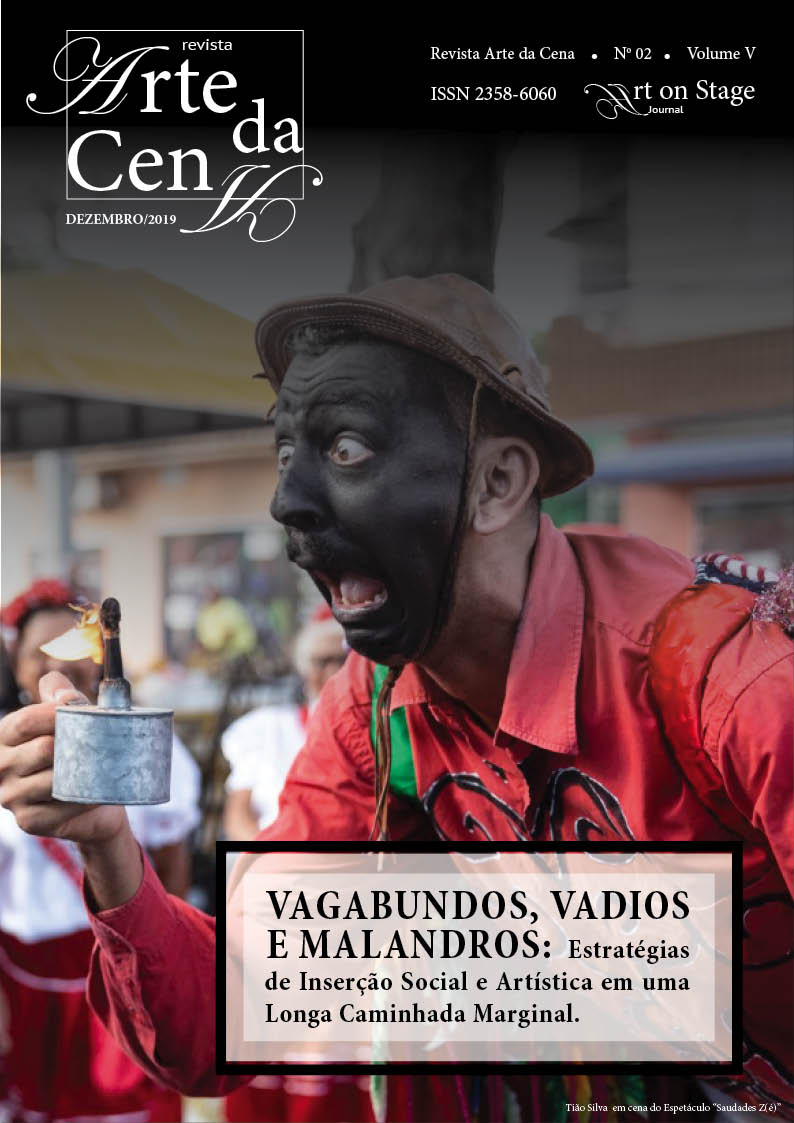
VAGABONDS, ROVERS AND ROGUES: Strategies of Social and Artistic Insertion on a Long Marginal Path
Vol. 5 No. 2 (2019)This issue will discuss and promote reflections on the “malandro” type – the Brazilian Portuguese word for a social and cultural concept similar to a “rogue” –, by perceiving approaching strategies and attempts of social belonging, which theatre actors and actresses’ had resorted through history, as unsubmissive modes of action and other meanings of belongingness. Artists of multiple talents, the jongleurs wandered through festivals and fairs in the Middle Ages. Playwrights, bearers and interpreters of songs and legends played an important cultural role when transiting from aristocratic to popular venues by merging the sacred with the profane and by propagating other ideas and forms of expression inside and outside borders. The professionalization of these artists was the outcome of a long-term process on their vagrant condition. Since the drug trade had decreased, charlatans began to commercialize their comic scenes performed with masks and fixed character types. Hence, the comic type of the “malandro” (rogue) had integrated acting repertoires, since its engagement to artists´ strategies of insertion on the straight and established society opposed a senseless and errant world. Considering the poignancy of this debate in theatre studies, the Art on Stage Journal (Revista Arte da Cena) dedicates a dossier to this theme and welcomes articles from artists (and) researchers who has been poetizing and debating these issues. In this way, articles that aims to identify elements to challenge our certainties and our latent prejudice regarding certain rejected and marginalized traditions might be of interest. The path is amidst the undignified personifications of some amoral poetics such as the hermetic symbols of “pelintras” (kind of trickster) and rovers who are both able to grant citzenship to the obscure areas of our creative power in the art scene.
-
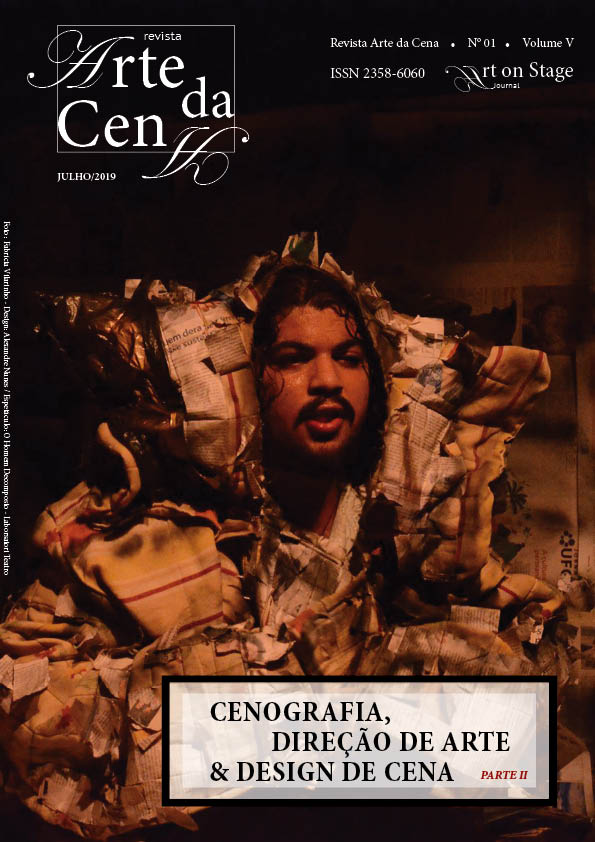
Scenography, Production Design and Design of Scene - Part II
Vol. 5 No. 1 (2019)Its aims are discussing and promoting reflections on non-verbal poetics of the scenebased on theories, methods and creative processes related to the fields of visual, spatial and sound composition, characterization ofactors, dancers and performers, puppet theatre, use of image and sound technologies in the scene, as well as the interfaces between the performing arts and the visual arts, design, architecture, city, cinema and other fields, in hybrid or deterritorialized forms.
-

Cenografia, Direção de Arte & Design de Cena - Parte I
Vol. 4 No. 2 (2018)A presente edição da revista Arte da Cena traz a primeira parte do dossiê temático Cenografia, Direção de Arte e Design da Cena. Devido à grande demanda de propostas submetidas, os organizadores decidiram dividir o dossiê em duas partes, reservando outros artigos relacionados aos presentes estudos para o próximo número da revista, quando o dossiê se fará completo.
-
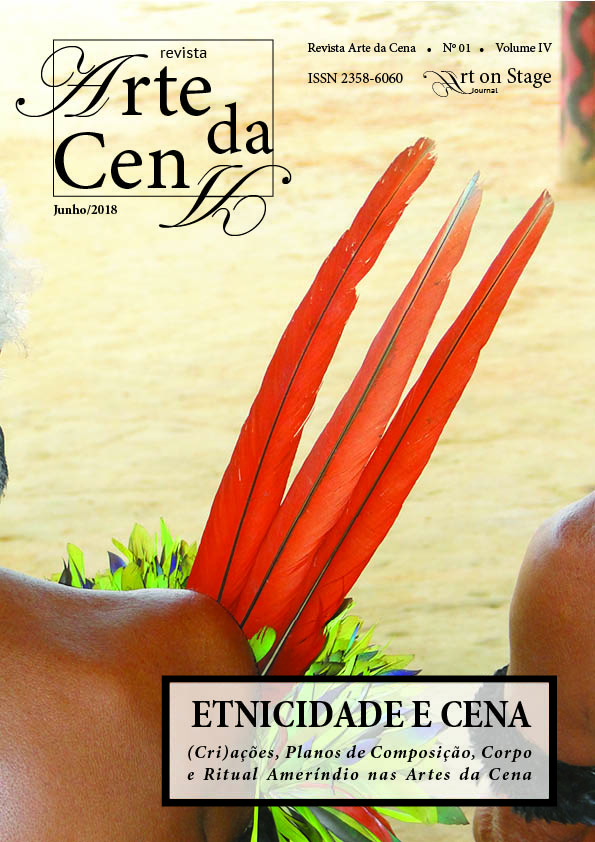
ETHNICITY AND SCENE: Creations, Plans of Composition, Body and Amerindian Ritual in the Performing Arts
Vol. 4 No. 1 (2018)O presente dossiê buscou reunir e apresentar artigos originais que discutam o tema da etnicidade e seus entrelaçamentos com o teatro, a dança, o circo, a performance, o audiovisual e todas as possibilidades de hibridização cênica, em seus múltiplos contextos e possibilidades, incluindo as perspectivas antropológicas, políticas, territoriais e ambientais. Deste modo, o dossiê traz artigos que analisam, de modo geral, a presença ameríndia e suas cosmologias nas Artes da Cena, incluindo questões étnicas e os conflitos a elas relacionados, a problematização do local do pesquisador diante das matrizes culturais, discussões sobre o corpo (des)colonizado e o ritual performativo/performado.
-
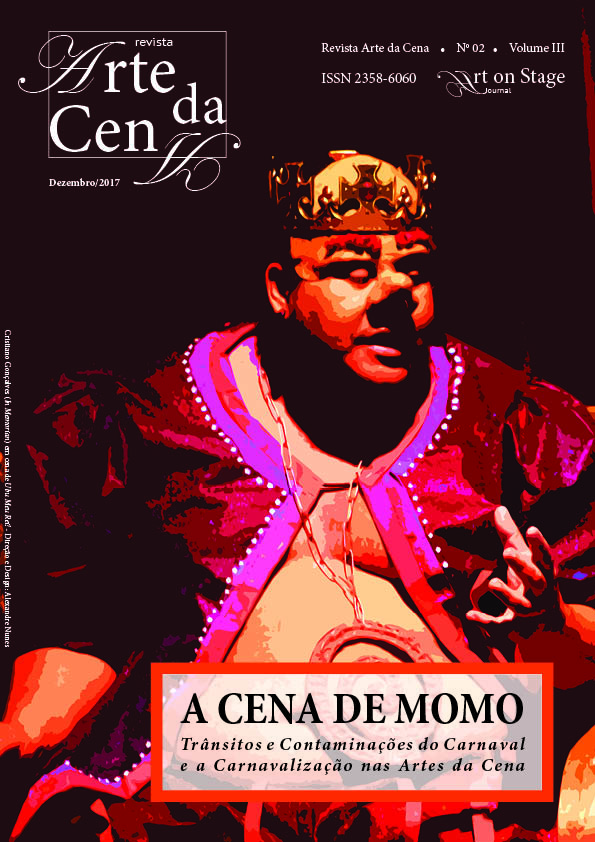
A CENA DE MOMO: Trânsitos e Contaminações do Carnaval e a Carnavalização nas Artes da Cena
Vol. 3 No. 2 (2017)Este número da Revista Arte da Cena traz o Dossiê Temático A CENA DE MOMO: Trânsitos e Contaminações do Carnaval e a Carnavalização nas Artes da Cena. Buscou-se com o dossiê colocar em discussão uma das festividades culturais que mais relações diretas apresenta com o campo da cena e que sempre a atravessou, em diversas circunstâncias ao longo da história. Deste modo, a edição busca discutir a estética cênica em seus cruzamentos com a carnavalização, bem como as possibilidades de hibridização tanto artística quanto social, em seus múltiplos contextos e possibilidades. -

v. 3, n. 1 - MOTIM - Mito, Rito e Cartografias Femininas nas Artes da Cena
Vol. 3 No. 1 (2017)No MOTIM, os campos colaborativos do mito e do rito, rechaçados pelas ciências duras e pelas artes formalistas ganham discussões. Estes eixos de pesquisa acabam por fomentar coletivos de artistas atrelados a processos autorais, partindo de mitologias pessoais para criação, assim como investigação de contextos de alteridade, que dialogam com camadas de pessoalidade. Por sua vez, esse alcance do que é pessoal na produção artística, em especial, na produção artística de mulheres, galga seu aspecto político e público, com inspiração feminista no trato dos mais variados temas. Neste número da Revista Arte da Cena, o periódico se dedicado aos engendramentos da pesquisa e da produção artística movidas por mulheres, artigos que pudessem revelar as estratégias de criação cênica e os impulsos reflexivos de pesquisadoras em recantos diversos do território nacional. -
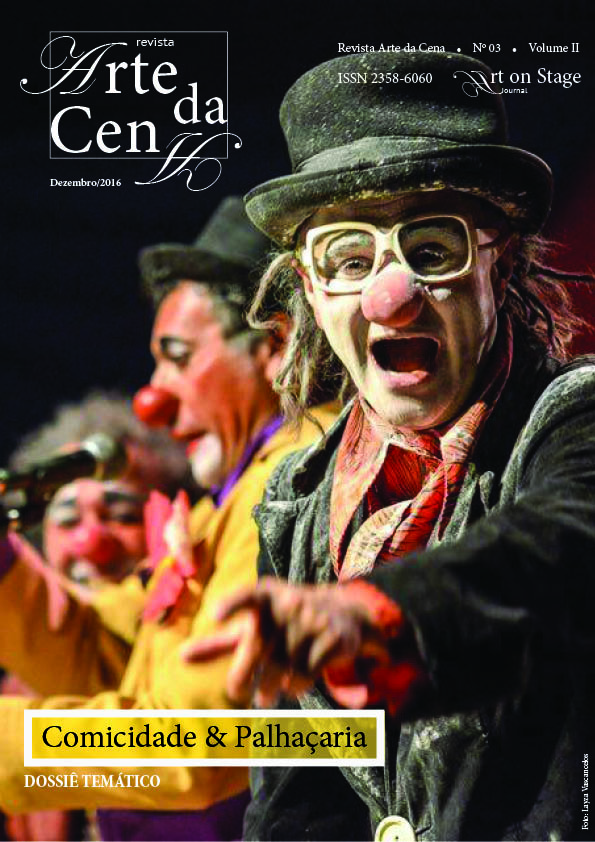
v. 2, n. 3 - Comicidade e Palhaçaria
Vol. 2 No. 3 (2016)Esta edição da Revista Arte da Cena traz para o público leitor, o dossiê temático: "Comicidade e Palhaçaria", que não poderia ter se concretizado sem a importante parceria estabelecida com o Na Ponta do Nariz, Festival Internacional de Palhaçaria e Comicidade, organizado pelo grupo de teatro Bastet (GO). Esta edição da Revista Arte da Cena traz além das discussões sobre comicidade e palhaçaria apresentadas em forma de artigos, há uma entrevista realizada junto a Alejandro Rodriguez e Robin Gentien. -
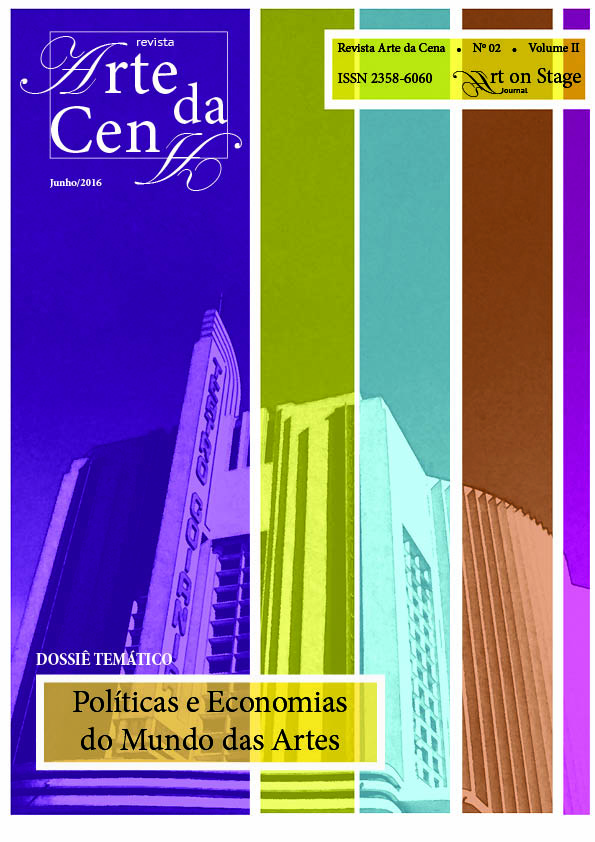
Políticas e Economias do Mundo das Artes
Vol. 2 No. 2 (2016)O dossiê temático POLÍTICAS & ECONOMIAS DO MUNDO DAS ARTES desenvolve-se num formato desterritorializado, onde o tópos das políticas, da ação artística, das macro e micro economias das artes da cena são analisados numa perspectiva que vai além do campo cênico, colaborando com uma abordagem transdisciplinar.
Além do dossiê, este número traz também outros quatro artigos, além de uma resenha sobre recente publicação de Rustom Barucha. E é no contexto das relações entre o dossiê e os demais textos que experimentamos um significativo trânsito entre os territórios da política, da economia, da performance, do mito e da história.
-
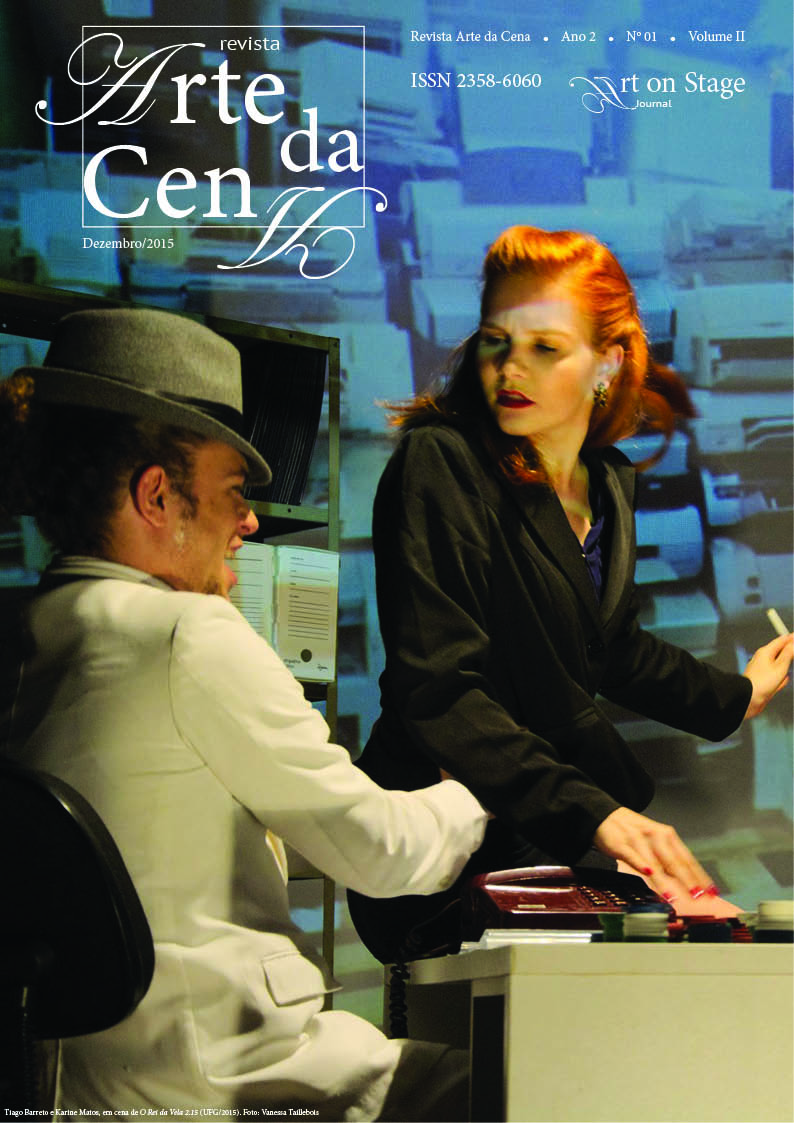
Aberturas da Cena
Vol. 2 No. 1 (2015)Duas das grandes revoluções do teatro moderno foi, primeiro, elevar o status do encenador, e, segundo, elevar o status do ator, no contexto geral da espetacularidade. Por outro lado, é chegado o momento em que o status de todos os componentes da cena deverá ser elevado, para que a rica proposição de uma perspectiva rizomática de teatro, seja fato e não apenas potência de discurso. Na perspectiva, diríamos politeista, das múltiplas associações, um teatro aberto a diversidade composicional, é um teatro consciente de todas as suas partes, facetas e processos. E nesta edição, a Revista Arte da Cena dá seqüência ao projeto de criar novas aberturas para perspectivas pouco observadas, no rol de publicações de estudos cênicos, seguindo fielmente os objetivos dispostos em seu escopo.
-
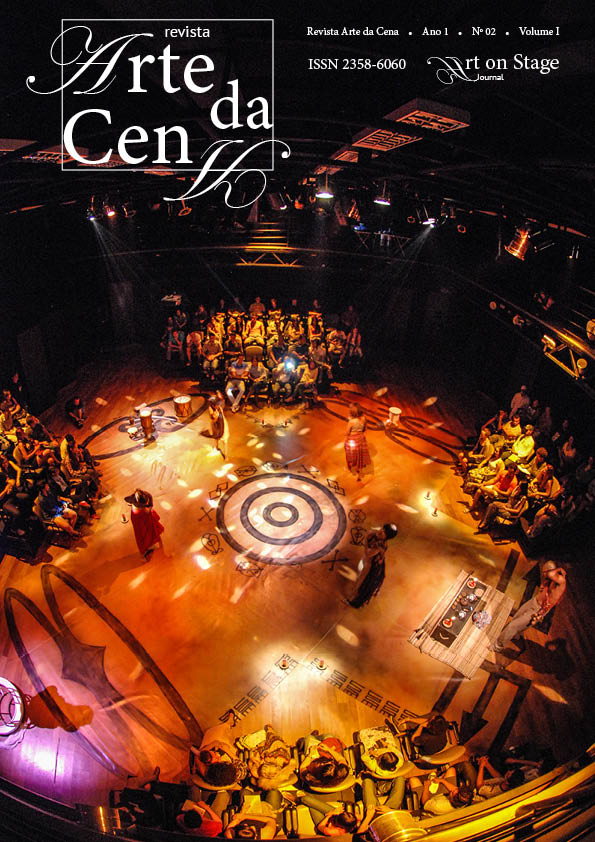
Revista Arte da Cena
Vol. 1 No. 2 (2015)O segundo número da revista Arte da Cena traz para o leitor uma amostra singular da pluralidade de enfoques que o periódico visa contemplar: não apenas as vozes discordantes sobre a cena, como também as vozes polissêmicas sob a cena. Como consequência de uma abertura de perspectivas, temos uma expansão do conceito de cena, que nos é apresentado por diferentes perpectivas desde a performance, a dança e o teatro como manifestações artísticas. -
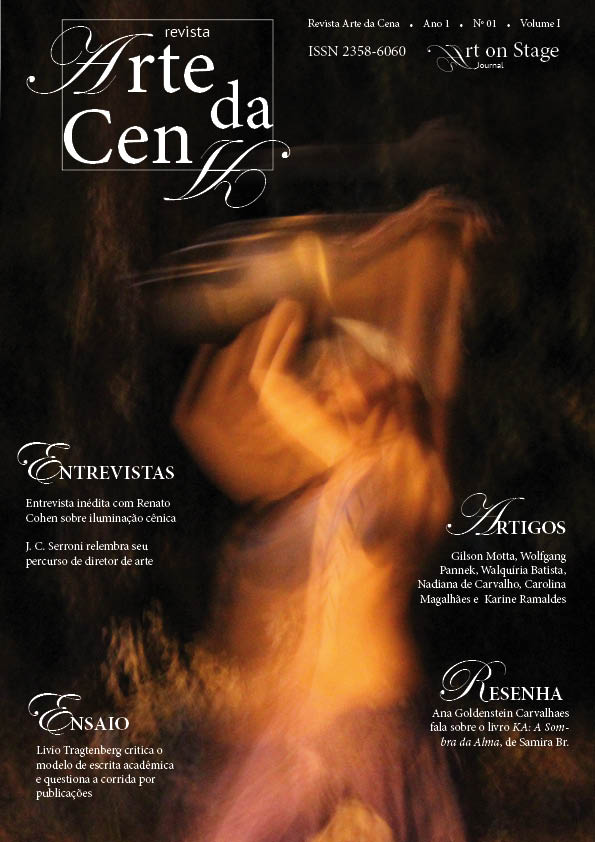
Revista Arte da Cena
Vol. 1 No. 1 (2014)O primeiro número da revista Arte da Cena chega a público, em formato digital, trazendo contribuições de autores de referência, no universo cênico contemporâneo, aliadas a trabalhos de novos pesquisadores, que surgem no cenário atual para colaborar com a renovação do pensamento e prática artística, em suas relações com a pesquisa científica e as atividades acadêmicas.


